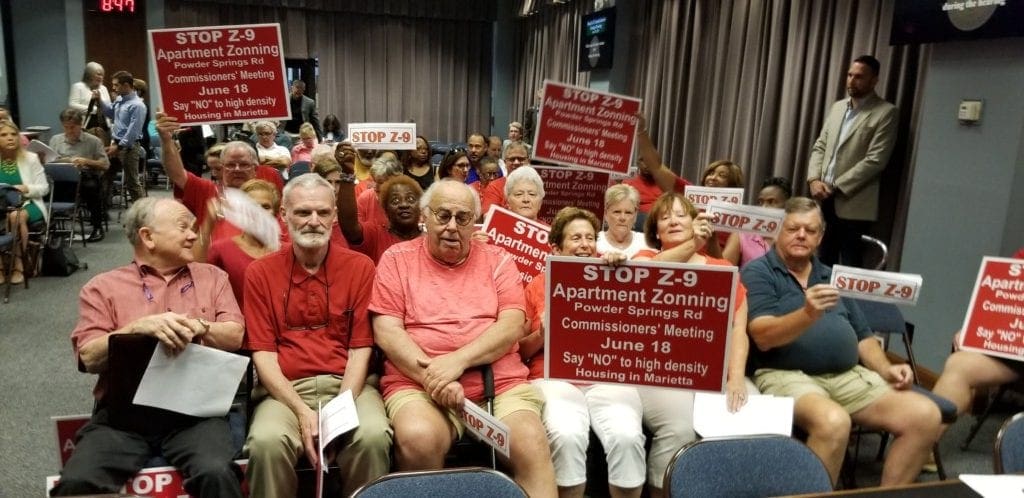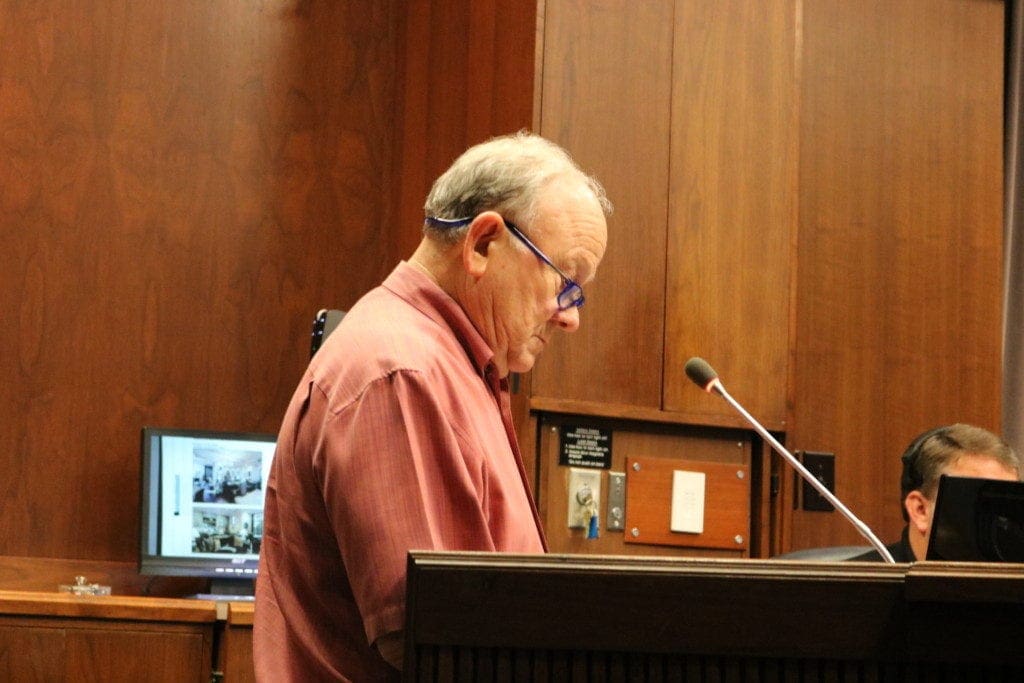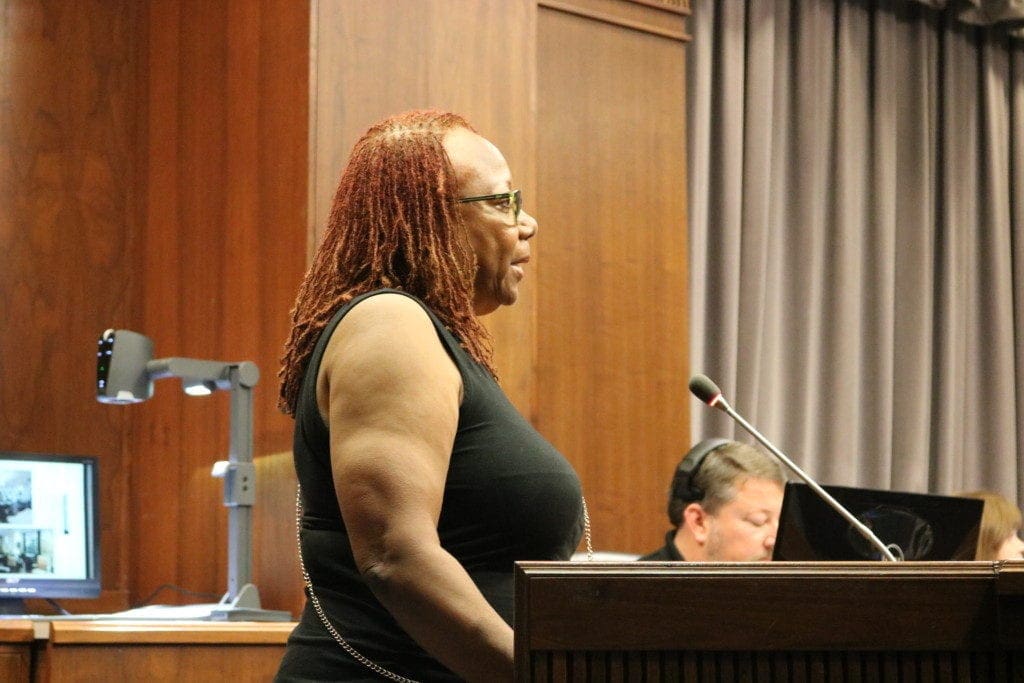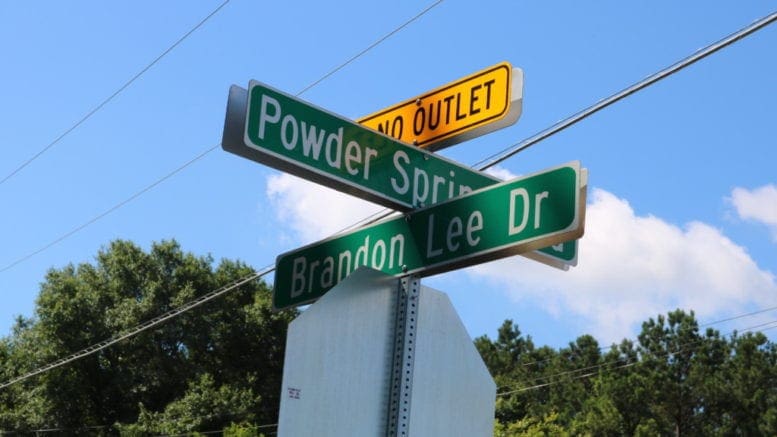The Cobb County Board of Commissioners, in its zoning hearing on June 18, denied a rezoning request that would have allowed 132 age-restricted rental townhomes at the intersection of Powder Springs Road and Brandon Lee Drive.
The applicant was Blake Properties, Inc. of Marietta.
The documents for the request, Z-9-2019, can be found by following this link.
There was substantial opposition to the request from neighbors in communities near the property, with many of them wearing red t-shirts and holding signs. The neighbors who spoke were from the Grove Park community, which is across Powder Springs Road from the property, and Macland Station, immediately adjacent to the site.
The opponents cited the density of the development, the rental nature of the planned units, and traffic concerns as their reason for opposition.
When opponents and supporters were asked to raise their hands before the public comments, 36 people were opposed to the zoning application and 3 were in support.
The property is currently zoned under three different commercial categories: GC, NS, and NRC, and the applicant requested that the property be rezoned to RM-8. (Those categories are described in detail at the bottom of this article).
Interactive Google map of the location
Presentation from the applicant
Attorney Kevin Moore, representing the applicant said there was a demand for age-restricted units for lease, and that in other jurisdictions they had worked well.
He referred to the signs held by opponents of the development, many of which said, “Stop Z-9 apartment zoning,” and showed a rendering of the single-story attached townhomes proposed by the developer.

He said that “apartment” usually applies to multi-story multi-family units, but that the plan his client is submitting is for story-and-a-half attached townhomes.
“This isn’t high-density affordable apartments,” he said. “Not apartments in the sense (of) what you and I think of as apartments.
He said later, after an opponent had spoken in opposition to rental property in the community, “I just want to reiterate the what and the who … The people that would live in it don’t look any different from the people sitting right behind me who live in their own age-restricted community.”
“They just choose to lease instead of buy,” he said. “We’re not going to have roving gangs of 55 year old plus residents destroying Macland Station. Quite the opposite. Just because you choose to lease doesn’t make you less than someone who chooses to buy.”
The opposition


Rex Renfrow, the president of the Grove Park Homeowner’s Association said, “We oppose this development. Not that we oppose any development, but this development we oppose. “
He said neighbors of the property collected over 300 signatures in opposition to the development.
Renfrow mentioned the various reasons county staff gave for recommending denial of the application, including non-conformance with the county’s land-use plan for the area, and possible adverse effects on the surrounding neighborhoods.
Renfrow questioned the formula used by the Cobb DOT which projects that developments for seniors generate 30 percent of the vehicular trips of mixed-age developments of comparable size.
“I want to talk to you a bit about the traffic analysis,” he said. “Grove Park is a senior adult community, 55 and over. Fifty-five. We’re not retired. We’re working. The majority of the people are not 80, when you begin looking at whether you should quit driving, and your kids start fighting with you about taking the keys, as he would have you believe. Do you think thirty percent is your number? That’s what you based your traffic analysis on.”
He said, “My gracious! These are people who are working, people who are active. I am 74 years old. I work for the Braves. I don’t sit at home. For your future plans, you need to talk about 30 percent as the number you use. If you approve this thing, it’s going to make the traffic at the Macland Road/Windy Hill intersection impossible. Right now it’s only next to impossible.”

Gloria Irvin, the secretary of the Macland Station HOA, said, “It’s very important to us at Macland Station and I’m sure Grove Park to have security, and we’ve had that over the years. But if you begin to bring in the beautiful word of ‘lease,’ which we know that really means rent, into a community, then you’re opening yourself up to all kinds of people. And I’m not just making any disparaging remarks. This is a fact. And so this is something that we do not support. Period.”
She also agreed with Renfrow’s concerns about traffic. “We live in metro Atlanta and so we know there are traffic issues,” she said. “To say that this subdivision or this complex will not have any effect on traffic just doesn’t make any sense. We have a problem already, we’ve discussed that and all the points that have made have been valid points.”
The decision
District 4 Commissioner Lisa Cupid, who represents the area of the rezoning request, said, “People lease or rent for varying reasons, and for many of us who’ve started out or may end up in certain circumstances in life may find ourselves renting at some point in time. And sometimes I think those that do rent are painted with a broad brush.”
“But this zoning is certainly much larger than the issue of leasing or renting. And I do think that Mr. Renfrow did an excellent job of laying out concerns of this development, many of which I share,” she said.
“I think the biggest challenge in approving this zoning lies in the density that is proposed, that is not comparable to the other developed residential communities around it. And (as) was stated in the staff analysis, the highest density of any community in that area is 4.77 units per acre, which is associated with the Macland Square condominiums.”
She said, “And this is not just a numerical analysis but even looking at the site plan for this property it was hard for me to perceive how a sense of community was being fostered with the way that the units were being developed on this property.”
“For this to be a senior development where somebody may end up spending the rest of their years,” she said, “there’s just no village concept, there’s no construct that creates a sense of community. The way that it’s laid out it’s just a row of unit after unit after unit. And I just could not feel a sense of place that would exact a rent at this rate.”
District 2 Commissioner Bob Ott directed a comment to the Cobb DOT. He said he agreed with Renfrow that the traffic estimates for age-restricted developments should be reconsidered in the light of people retiring later.
“I think the gentleman who spoke in opposition is dead on. In the line of work I’m in we don’t retire until 65, so that’s 10 years after I could be living in one of these facilities … This 30 percent number I think is outdated and not consistent with today’s society.
Cupid made a motion to reject the application, and it passed 5-0.
Video of the hearing on Z-9
Zoning categories mentioned in this request
RM-8
The Cobb County Code of Ordinances describes the RM-8 zoning classification as follows:
The RM-8 district is established to provide locations for multifamily residential uses or residentially compatible institutional and recreational uses which are within properties delineated for medium and high density residential and regional activity center categories as defined and shown on the Cobb County Comprehensive Plan: A Policy Guide, adopted November 27, 1990. When residentially compatible institutional and recreational uses are developed within the RM-8 district, they should be designed and built to ensure intensity and density compatibility with adjacent multifamily detached dwellings and otherwise to implement the stated purpose and intent of this chapter. Acreage within floodplains and/or wetlands shall be excluded when calculating the overall density of the development.
NRC
The NRC (Neighborhood Retail Commercial) zoning classification is described in the Cobb County County Code of Ordinances as follows:
NRC (neighborhood retail commercial). The NRC district is established to provide locations for convenience shopping facilities which are on properties delineated within a neighborhood activity center, community activity center or regional activity center as defined and shown on the Cobb County Comprehensive Plan: A Policy Guide, adopted November 27, 1990. These convenience shopping facilities should have retail commercial uses that have a neighborhood-oriented market and which supply necessities that usually require frequent purchasing with a minimum of consumer travel. Areas zoned for the NRC district should be located at or near an intersection within the center of a neighborhood activity center as opposed to the edge of a neighborhood activity center. The NRC district may also be used to provide step down nodal zoning away from more intensive commercial uses within a community activity center or a regional activity center. The scope at which properties are developed within the NRC district should reflect their relatively small neighborhood service area. Additionally, properties developed within the NRC district should be architecturally compatible with other nonresidential uses permitted within a neighborhood activity center as defined by the comprehensive plan and the neighborhood residences they serve.
GC
The Cobb County Code of Ordinances describes the GC zoning category as follows:
GC (general commercial). The GC district is established to provide locations for retail commercial and service uses which are oriented toward automotive businesses, are land intensive with a need for major road access and visibility, and are located in areas delineated within a community activity center and regional activity center as defined and shown on the Cobb County Comprehensive Plan: A Policy Guide, adopted November 27, 1990. Commencing January 1, 1991, no applications for rezoning to the GC district will be accepted by the board of commissioners for properties located in areas delineated within and shown on the comprehensive plan. This shall only apply to industrial-compatible and industrial areas. Any existing GC district, developed or undeveloped, located within an area delineated within an industrial-compatible area or industrial area as shown on the comprehensive plan, shall be deemed to be a grandfathered, nonconforming use after January 1, 1991, and subject to those provisions contained in this chapter. Any existing developed GC zoning/use located outside of a community activity center or regional activity center shall be deemed to be a grandfathered, nonconforming use and subject to those provisions contained in this chapter. Should any undeveloped property zoned GC outside of a community activity center or regional activity center fail to commence development by January 17, 1996, the owner of such property shall be required to bring the property back in for rezoning consistent with the comprehensive plan prior to any development. Obtaining a building permit or grading permit for such development shall be deemed to be commencing development. Due to the fact that general commercial has been the predominant commercial zoning district since its inception in 1972, the board of commissioners has determined that certain uses previously permitted are no longer appropriate for properties within an area delineated as a community activity center as defined and shown on the Cobb County Comprehensive Plan: A Policy Guide, adopted November 27, 1990. See section 134-227(12) for those uses no longer appropriate.
NS
The Cobb County Code of Ordinances describes the NS (Neighborhood Shopping) zoning category as follows:
NS (neighborhood shopping). The NS district is established to provide locations for retail commercial and service uses which are designed and oriented to serve two to four neighborhoods and are located in areas delineated within a community activity center or regional activity center as defined and shown on the Cobb County Comprehensive Plan: A Policy Guide, adopted November 27, 1990. Commencing January 1, 1991, no new applications for rezoning to the NS district will be accepted by the board of commissioners. Any existing developed NS zoning/use located outside of a community activity center or regional activity center shall be deemed to be a grandfathered, nonconforming use and subject to those provisions contained in this chapter. Should any undeveloped property zoned as NS outside a community activity center or regional activity center fail to commence development by January 17, 1996, the owner of such property shall be required to bring the property back in for rezoning consistent with the comprehensive plan prior to any development. Obtaining a building or grading permit for such development shall be deemed to be commencing development.

